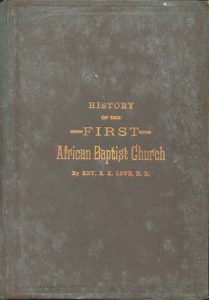In the debate over the origins of Black spirituals in the southern United States, George Pullen Jackson, makes many problematic and strong claims. A notable musicologist specializing in southern hymnody, Pullen’s tone and voice in communicating his “true” origins of Black spirituals is heard loud and clear.
In the telling of all history, however, it is commonly acknowledged that it is told from the perspective of the “winner”. Thus in good practice, it is important to search for and listen to the perspectives of other stakeholders in said history, who may tell a very different history.
As Black southerners were Christianized in the mid-1700s, four out of five Black church members eventually flocked to Baptist churches (Jackson, 286). This proportion is astounding, and impossible to not feel the need to inquire more about. This of course led me to wanting to know more about the first and oldest Black Baptist church.
The First African Baptist Church was organized in 1773 under the leadership of Rev. George Leile, — making the church even older than the United States itself! Today, the First African Baptist Church prioritizes its religious and physical history, which you can learn more about here!
In researching the First Black African Church, I came across a book entitled “History of First African Baptist Church”, compiled by Rev. E. K. Love, and contributed to by dozens of Black and African American Georgian Reverends.
In one entry to the book, Rev. T. J. Hornsby writes on the relationship between white and Black Baptists. According to Hornsby, the supposition that there was no relation between white and Black Baptists in antebellum days can not be true. Hornsby preaches and writes that because white and Black Baptists believe in and come from the very same Father, they are brothers, regardless of the oppressive behavior and beliefs of white Baptists.
“On account of condition or circumstances one may ignore a brother by actions, and refuse to accord to him a brother’s recognition, but it does not destroy the relationship.” — Rev. T. J. Hornsby
Hornsby emphasizes the fact that they sat in the same seats, heard the same sermons, and sang the same songs. However, Hornsby also tells of the willingness of Black Baptists to return to their duties to their “brothers” when given the opportunity to pray.
This text is thus distinctive in that even though the connotation of the words “brother” and “brethren” is one of equality and mutuality, Hornsby also paints the now well-understood picture of indoctrination through Christianization in a light that deems it understandable.
“The pastor would preach to them earnestly and faithfully, and at times growing truly eloquent in his discourse, and, among many other good things, he would not forget to exhort them to obey their masters, to be honest and industrious, for this is your reasonable service. And, I tell you, the doctrine to the brother in color was both appropriate and timely.” — Rev. T.J. Hornsby
At the time Hornsby wrote this entry, during the mid to late-1800s, it is clear that he was still living in and perceiving a society and culture that did not view African American and Black people as equal individuals, and is far more complex than the length of even a dozen of these blog posts could cover (But you should read his entry on pages 253-257 to get an idea!)
If you’re curious for more…
History of First African Baptist Church
And here is a recording of one of the songs mentioned by Hornsby!
Sources:
https://firstafricanbc.com/history.php
https://www.youtube.com/watch?v=jS1K6Bhu3Hg&t=82s
Love, E. K, Charles T Walker, and Richard Robert Wright. History of the First African Baptist Church: From Its Organization, January 20th, 1788, to July 1st, 1888. Including the Centennial Celebration, Addresses, Sermons, Etc. Savannah, Ga: The Morning News Print, 1888. Print.




